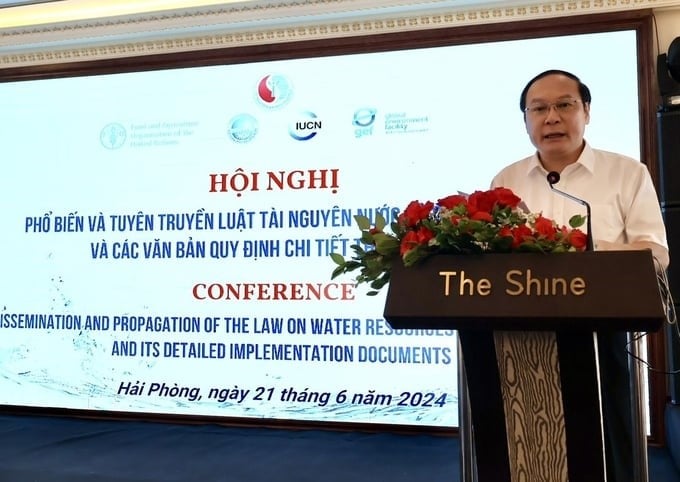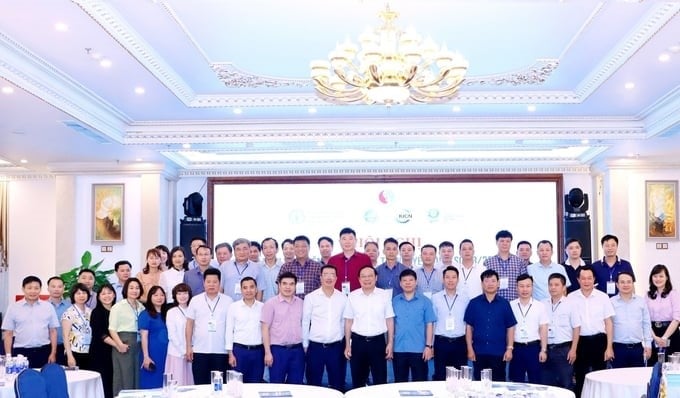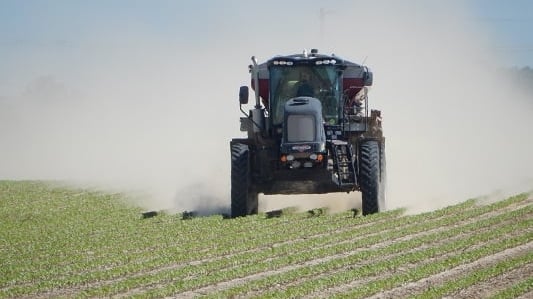May 18, 2025 | 04:05 GMT +7
May 18, 2025 | 04:05 GMT +7
Hotline: 0913.378.918
May 18, 2025 | 04:05 GMT +7
Hotline: 0913.378.918
"Conference on Dissemination and Propagation of the Law on Water Resources and Its Detailed Implementation Documents" was organized by the Ministry of Natural Resources and Environment (MONRE) in Hai Phong on the morning of June 21. Deputy Minister Le Cong Thanh chaired the conference.
Attending the conference were representatives of the National Assembly's Committee on Science, Technology and Environment; representatives of the Ministries of Agriculture and Rural Development, Construction, and Industry and Trade; representatives of the Department of Water Resources Management and related units under MONRE; representatives of the Department of Natural Resources and Environment of 29 provinces and municipal cities in the Northern and North Central regions; representatives of international organizations; together with reporters from central and local press agencies; and other relevant agencies and units.

Deputy Minister of Natural Resources and Environment Le Cong Thanh spoke at the conference. Photo: Gia Chinh.
The conference was organized with the support of the Global Environment Facility (GEF) project "Fostering Water and Environmental Security in the Ma and Neun/Ca Transboundary River Basins and Related Coastal Areas (Lao PDR and Vietnam)" implemented by the International Union for Conservation of Nature (IUCN) through the Food and Agriculture Organization of the United Nations (FAO).
At the conference, MONRE introduced an overview and new points of the Law on Water Resources approved by the National Assembly and introduced detailed implementation documents of the Law on Water Resources 2023. Specifically, these documents include Decree No. 53/2024 dated May 16, 2024 of the Government detailing the implementation of some articles of the Law on Water Resources; Decree No. 54/2024 dated May 16, 2024 of the Government regulating groundwater drilling practice, water resource declaration, registration, licensing, and servicing, and levy on grant of the water extraction right. Circular 3/2024 dated May 16, 2024 of the MONRE detailing the implementation of some articles of the Law on Water Resources; Circular 04/2024 dated May 16, 2024 of the MONRE regulating audit of compliance with laws on water resources and appraisal and acceptance of results of the baseline survey of water resources; and Circular 05/2024 dated May 16, 2024 of the MONRE regulating the relocation, change of location, and dissolution of underground water resources monitoring stations.
The conference discussed and clarified contents that may have different interpretations for MONRE to answer, facilitating the implementation of the Law on Water Resources and its detailed implementation documents.

Delegates attending the Conference on Dissemination of the Law on Water Resources on the morning of June 21. Photo: Gia Chinh.
Speaking at the conference, Deputy Minister Le Cong Thanh shared: The Law on Water Resources and detailed implementation documents issued stipulate the specific responsibilities of agencies, departments, and branches at the Central and local levels. Of which, the Law assigned localities to deploy 28 contents to implement the Law. The contents include a basic investigation; exploitation plans in provincial planning; establishment and demarcation of corridors to protect water sources; restrictions on exploitation of underground water; sanitary protection zone for domestic water intake works; establishment and promulgation of a list of lakes and ponds that cannot be leveled; minimum flow on rivers and streams within the province, etc.
The decentralization and emphasis on promoting the roles and responsibilities of relevant parties have been specified in two Decrees and three Circulars guiding the implementation of the Law on Water Resources (all take effect with the Law on Water Resources dated July 1, 2024).
MONRE hopes that this will be an opportunity to launch multilateral dialogue among key relevant parties, including policymakers; ministries and inter-sectoral branches; and local governments, to share and discuss challenges and priorities in transboundary water resources management; introduce international transboundary water management projects and opportunities to restructure and establish river basin organizations; and share difficulties and challenges of water resources in transboundary rivers.
The Law on Water Resources and detailed implementation documents were promulgated, marking a huge step forward in thinking and approach and changing water resource management methods in the context that Vietnam's water resources are assessed to still have many challenges. Four policy groups include: Ensuring water security; Socialization of the water industry; Water resource economics; and Water resource protection, prevention and control of harmful effects caused by water.

Through the conference, MONRE hopes that this will be an opportunity to launch multilateral dialogue among relevant parties to share and discuss challenges and priorities in transboundary water resource management. Photo: TL.
To implement the above-mentioned legal documents, MONRE has submitted to the Prime Minister a plan to implement the Law (Decision No. 274-TTg dated April 2, 2024), propagate, and disseminate laws on water resources through the mass media. At the same time, as soon as the documents detailing the implementation of the Law were promulgated, MONRE sent three documents to provinces and municipal cities, requesting dissemination of the documents as well as readiness to deploy when the above-mentioned documents take effect.
With MONRE's great efforts, up until now, the new system of legal documents on water resources has been completed on schedule and with good quality. This is also one of the specialized legal systems developed and completed synchronously, ensuring the institutionalization of new viewpoints, guidelines, and policies of the Party, especially the Law on Water Resources, two Decrees guiding the implementation of the Law, and three Circulars. These documents will be implemented synchronously, effectively, and efficiently in practice and will have the same effect as from July 1, 2024.
According to the Ministry of Natural Resources and Environment, in the process of developing the Law on Water Resources 2023, the drafting agency has received the attention of many partners and international organizations such as the World Bank, AFD, KOICA, IUCN, JICA, FAO, GEF, etc. to share and understand more deeply the management model, context, level of development, and practical implementation of policies in advanced countries around the world, as well as countries with similar conditions to Vietnam.
In particular, the Global Environment Facility (GEF), implemented by the International Union for Conservation of Nature (IUCN) through the Food and Agriculture Organization of the United Nations (FAO), has coordinated and actively supported the process of building and completing the institutional framework, policies, and legal corridors to facilitate and promote international cooperation on water resources. Thereby protecting, exploiting, and developing transboundary water resources and related freshwater ecosystems in a direction of sustainability and optimizing benefits for countries sharing the same water resources.
Translated by Thu Huyen

(VAN) Hue City rigorously enforces regulations regarding marine fishing and resource exploitation, with a particular emphasis on the monitoring of fishing vessels to prevent illegal, unreported, and unregulated (IUU) fishing.

(VAN) Hanoi People's Committee has issued a plan on reducing greenhouse gas emissions in the waste management sector with 2030 vision.

(VAN) Vietnam's draft amendment to Decree No. 156 proposes a mechanism for medicinal herb farming under forest canopies, linking economic development to population retention and the sustainable protection and development of forests.

(VAN) In reality, many craft village models combined with tourism in Son La have proven effective, bringing significant economic benefits to rural communities.

(VAN) The international conference titled Carbon Market: International experiences and recommendations for Vietnam was successfully held recently in Ho Chi Minh City.

(VAN) According to the Project on rearranging provincial and communal administrative units, in 2025, the country will have 34 provinces/cities, 3,321 communes, wards, and special zones, and no district-level organization.

(VAN) The vice president of fertilizer with Stone X Group says the Trump administration’s tariffs are impacting fertilizer markets.